Standing Your Ground Against Justice: Murders Increase 300%
by Anthony Sibley (AJ) on Mar 3, 2014 | Views: 475 | Score: 3
| Justifiable Homicides, Florida (as reported by police) | |
|---|---|
| 2000 | 32 |
| 2001 | 33 |
| 2002 | 35 |
| 2003 | 32 |
| 2004 | 31 |
| 2005 | 43 |
| 2006 | 33 |
| 2007 | 102 |
| 2008 | 93 |
| 2009 | 105 |
| 2010 | 96 |
Sources:
politifact.com

 of
of

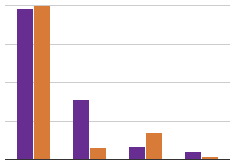
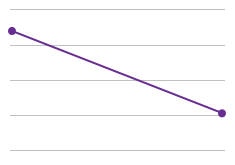
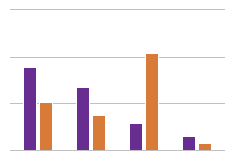
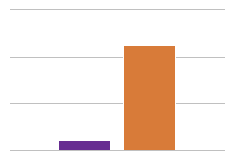
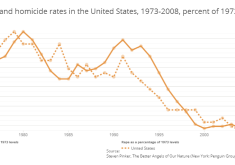
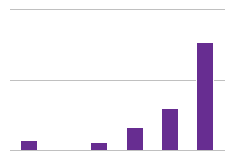
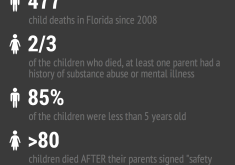
In the five years before Florida's "Stand Your Ground" law took effect, there was an average 32.6 justifiable-homicides annually, with 12 by civilians. In the five full years since it came into effect, that average has increased twofold, overall, and 300% for those by civilians. Is the effect to justify lawful self-defense or provide self-defense from lawful justice?
This data is not at all surprising, nor does it speak well for Florida's stand-your-ground law. An excuse for homicide.
This is a meaningless statistic. Look at the crime that stand your ground was intended to stop. Look at that trend over the last 20 years to gauge effectiveness.
Erik Blazynski if the intended result was 60+ more homicides a year, then that's not a law that should have ever been passed.
On a different note - check out the baseline value of 30 rather than zero. Makes the graph look like more of a drastic difference from 2006 to 2007 and so on.
I think a designer would want to make good use of space by not extending a chart more than necessary, but that's not likely the case here - it's the web. There's plenty of space for the full height of the chart to show the values accurately.
I tend to agree with you there, without qualifying data it's not very useful.
Doug Hardy Yup, the way to skew data without skewing data is to skew the chart.
Notably, the original article presents a simple chart. The graph was created for this and...there you have it...bullshit. Whatever it says, it's bullshit.
I have no control over the parameters of the chart I am afraid. You put the data in, and it sets it for you.
Regardless, as you said, the data is not skewed. The disparity between the average 200-2004 and that of 2007-2010 is no different (as the both start at 30).
Scott Carlson and Erik Blazynski: Yes, violent crime has decreased, but at what cost?
Doug Hardy The chart sets its own scale based on the data inputed. Nonetheless, the measured disparity is just as large, i.e. 33 to 102 is still 69.
Anthony Jamal Sibley That really wasn't the point. The point is that the article is statistically invalid - skewed to make a point whether or not that point is true. As Doug noted below, the graphic starts at 30 and not zero to make the bars from 2006 down appear to be smaller relative to the ones from 2007 up. Nice bit of intellectual dishonesty but did you really think you'd get away with it?
Well you have to compare that violent crime rate with the violent crime rates of other states. It is possible the cost is the death of criminals that were committing crimes against other people but you have to look at the stats.
David Agosta Let's not lose the forest for the trees. As I noted below, I have no control in setting the parameters for the chart scale; it does so automatically based on the data inputed (i.e. 30 was the lowest value so it scrapped 0-29). So before this becomes a conspiracy on my part, I ask you to accept that. Now, how about the data?
Clearly this is not an attempt to rationally analyze data but to make a predetermined point. The graphic is skewed to make that point and only the points in the original article that support the predetermined point are included.
Erik Blazynski Erik, very true, and very hard to find definitive data on whether the increases were based on would-be justifiable murders if the law had been in place versus increases in wanton killing. I'm awaiting more statistics to use for this very notion. Until such is published, it's prudent to point out the disparity nonetheless.
Anthony Jamal Sibley Why didn't you create this with 0 as the baseline? It really makes it look like you are trying to skew the perception. Although you clearly are trying to skew the perception.
Erik Blazynski David Agosta ....again, please see my previous clarification on the ability to set the scales.
Anthony Jamal Sibley OK I saw it. you need to create a 1999 - 0 record then so that it shows this properly. Seems that savvyroo is a piece of poo. I think it may not be prudent, if you find that the law is likely reducing violent crime then you are either going to have to ignore the finding and share only this statistic or you are going to have to publish your full finding and I am guessing that your employer is not going to be happy about that.
Anthony Jamal Sibley Your failure to include justifiable homicide by police is also problematic. The increase in that exceeds those by civilians and SYG cannot have had an effect on it. That throws your cause and effect argument out the window.
And the article you reference actually states "Without examining the numbers or the cases themselves, Kenney said it’s "highly likely" that there is a correlation."
Anthony Jamal Sibley You don't have a copy of Excel?
Hey y'all, missed these before. Thanks for that quote, that's exactly right-- various scholars and attorneys have asserted the same, that they believe the passage of the Stand Your Ground law to be associated with the subsequent drastic increase in justifiable homicides. As I stated above, ascertaining absolute causation, however, is impossible given existing data.
As for the justifiable homicides by police, which I did indeed include, the increase can be similarly associated with the SYG law's passage, as Kenney alluded to immediately after the text you quoted. "After all the publicity the [Trayvon Martin killing] is getting, you would expect [justifiable homicides] to go up much more." That is to say, the likelihood of someone killing an assailant in self-defense (for BOTH civilians and police) can be reasonable assumed to be influenced by that person's impression of the likelihood that they will be found guilty. This likelihood increased significantly following SYG. With the passage of a SYG law, and the subsequent slew of innocent verdicts for civilians, it is very likely that the police were too impacted--both in their own conduct, and in the judgement of their actions as justified or not. In essence, "local police departments are increasing viewing alleged defensile homicide as falling into the [definition of 'justifiable homicide']. I don't think they are trying to rig data, they honestly shifted their perceptions of what qualifies."-- Florida State University professor of criminology, Gary Kleck (quote from the article).
The law's potential reverbative effects on the judgement of police killings are very likely amplified by the peculiar conflict of interest present in our current system. The determination of whether a police homicide was justified if the authority of the local prosecutor-- who faces immense pressure to maintain favor with their corresponding police department-- and on the officer's own police department. For more expansive explanation of the institutional forces that I'm refering to:
www.vox.com/2014/11/25/717369…
www.thenation.com/article/190…